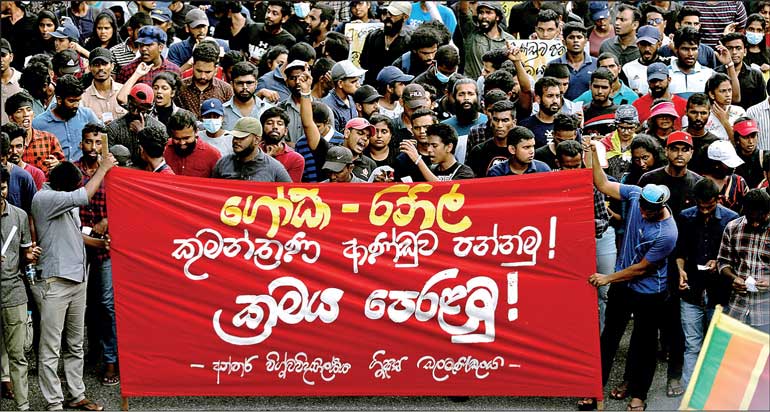Monday Feb 16, 2026
Monday Feb 16, 2026
Friday, 1 July 2022 00:10 - - {{hitsCtrl.values.hits}}

What is being heard everywhere is for people to go home; never was heard a voice beckoning someone to take control and steer the country out of the morass
 The Parliamentary Committee on Public Enterprises (COPE) now meets daily and its fact-finding discussions give an idea about the extent of corruption, inefficiency and the ugly nature associated with the activities of the Sri Lankan State and its institutional system. According to the facts being revealed before COPE, the factors contributing to the failure and bankruptcy of the country have originated not only after the emergence of the rule of Gotabaya, but long before that.
The Parliamentary Committee on Public Enterprises (COPE) now meets daily and its fact-finding discussions give an idea about the extent of corruption, inefficiency and the ugly nature associated with the activities of the Sri Lankan State and its institutional system. According to the facts being revealed before COPE, the factors contributing to the failure and bankruptcy of the country have originated not only after the emergence of the rule of Gotabaya, but long before that.
Also, it is evident that not only the actions of the politicians but also that of the government officials as well, has led to the failure of the country. The Parliament, which is responsible for overseeing the State and its institutions, should have looked into this matter not now but long before the country went bankrupt. It was too late when the Parliament realised the gravity of the situation.
Sri Lanka at this critical juncture is in a terrible abyss that is not easy to recover from. The country is now in a pathetic state of bankruptcy, failure and collapse on a large scale. Already the fuel shortage has severely disrupted traffic and transportation. The productivity of the manufacturing sector is also deteriorating. The shortage of drugs has led to large-scale decline in the efficiency of hospitals. The life expectancy of chronic patients is insecure. The number of those who have lost jobs is also high and living has become unbearable in the face of ever-increasing inflation.
The catastrophic collapse in agriculture caused by the ban on chemical fertilisers has not yet been able to be reversed and there may be a serious risk of food shortage by October this year. It was too late when the IMF was approached for its assistance and advice for resolving the balance of payments crisis. Consequently, resolving the balance of payments crisis has led to creating a very difficult situation and an extraordinarily unusual level of suffering.
From darkness to darkness
Sri Lanka does not seem to possess the ability to properly manage the crisis it is facing and in a manner capable of overcoming it. At least, it has not been able to distribute the scant supply of petrol procured with much difficulty in an effective manner. Despite the fact that the purchasing power of petrol and diesel has become extremely limited, Sri Lanka is still trying to follow a policy of providing petrol and diesel for all vehicles.
Similarly, in all other areas, things are taking place in a chaotic and ridiculous manner. There is not even a slightest trace of a silver lining visible except the thick darkness looming large over the horizon. All of them, the ruling party including the President, the Prime Minister and the Cabinet of Ministers and the Opposition, appear to be involved in a narrow power struggle; and they do not seem to be engaged in a significant task to overcome the general catastrophe the country is facing, compared to the magnitude of the issue. For some reason, neither the political regime nor the society in general seems to have a strong interest in overcoming this crisis. Evidently there a big mess and confusion in the way of thinking of all parties viz the Government, the Opposition, the youth involved in ‘Aragalaya’ (struggle) and the alternative political groups.
The presidential system of governance in Sri Lanka has been designed in such a way that there would be no room for change of government in the interim, except in a major election. The youth involved in ‘Aragalaya’ came up with the attractive and revolutionary slogan “GotaGo Home” without taking this reality into consideration. Though the youth of Aragalaya have managed to win some minor demands they have not been successful in winning the main demand. Now the struggle of the youth is in a state of collapse to a considerable extent.
It seems that the two rival political parties, the Samagi Jana Balawegaya (SJB) and the Janatha Vimukthi Peramuna (JVP) have taken up the banner of sending Gota Home which is now slipping out of the hands of the youth involved in ‘Aragalaya’, into their hands. Both parties assert that it is an essential condition that Gotabaya should be ousted first, from the presidency before anything happens
Towards a path of destruction
Do the above mentioned two parties possess a real ability, individually or collectively, to achieve the goal of removing President Gotabaya from office before the end of his term? Have they made this decision after careful consideration of the facts on the ground? Do these two parties believe that it is a goal that can be achieved with certainty? Could they offer a firm assurance that their attempt to oust the President outside the constitutional framework will not affect the ability to resolve the balance of payments crisis and plunge the country into a deeper abyss than it is now in? The way these two parties think is rather confusing. At this moment the existence of the country is lying in a very critical situation.
The street protests launched by political parties at this time without making a proper assessment of the situation could completely destroy the ability to resolve the crisis and plunge the country into a disastrous catastrophe. At this crucial juncture, the political parties must strive to achieve their aspirations only through the means that will not exacerbate or complicate the country’s crisis, including the balance of payments crisis. The best course of action for that would be to direct the country to a reform program that will enable a profound change in the system including an early election; in other words to form an all-party government where all of them could work together on a common program.
Such an initiative will help mitigate the crisis rather than aggravating or complicating it; it will also provide a strong foundation for resolving the balance of payments crisis and the other crises as well. At the same time, it will pave the way for the change of the presidential system of administration and enable a quick move into a parliamentary system of governance so that a profound structural change could be made in the system. Any other alternative measure, the consequences of which are unclear and tending to jeopardise the very existence of the country cannot be justified when a clear, effective and pragmatic option such as this is available to choose?
It should also be noted that this confusion is not a special feature unique to these two political parties only. It is a common feature inherent in all other areas (the ruling party, opposition political parties, the youth involved in ‘Aragalaya’ and in all ideological levels). What is being heard everywhere is for people to go home; never was heard a voice beckoning someone to take control and steer the country out of the morass. Not only the old political world of conventional political leaders but also the new world of young fighters is equally caught up in a web of unsuccessful confusion. The present crisis seems to have completely deprived not only the politicians but also the intellectuals and the society in general, of the ability to reason out rationally. In this situation a good outcome is not possible to be expected except a bad one. While the political leaders are engaged in a power hunt, the nation is being swept into a stormy region of tumult in the deep sea without any attempt being made to save her.